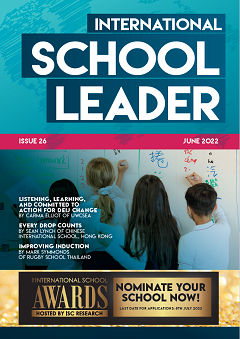By Lynn Kogelmann and Tanya Crossman
I often hear that children are resilient. While we want that to be true, and it certainly can be, resilience is not automatic. Resilience is developed when children go through difficulties with the support of caring and trusted adults. Third Culture Kids (TCKs), children who grow up outside their passport countries, face a lot of mobility and transition which increases difficulties that serve as sources of resilience – if adequate support is provided. When that support is not present, we see struggles with regulation, connection and empathy for others.
The pandemic increased these struggles exponentially. During multiple lockdowns in Malaysia, counselling staff at International School Kuala Lumpur (ISKL) noted students experiencing isolation, sleep issues, lack of social interaction and inability to practice social conventions in real-time. This pandemic effect continues even with the ‘return’ to normal. While the world believes in moving forward, our children struggle with their lost years of social and emotional development.
Yet this is not a time to despair, but rather a time for action. We can teach our students the tools of not just surviving but thriving, implementing strategies we know protect and support students in our care.
Relying on research
Data collection is vital to effective interventions. A classroom teacher in the midst of behaviour challenges can feel like these challenges are happening all the time. When we collect data, however, we discover these behaviours are happening 40% to 60% of the time. There are good moments in between, which, once we have that data, we can recognise and capitalise on.
Much of TCK care leans on anecdotal evidence due to a lack of specific research, especially in regard to long-term outcomes. New research by TCK Training offers insights that give a solid foundation and direction for our work, showing why certain tools we use are vital for student wellbeing over the lifetime of a child.
Decades of research have looked at the impact of adverse childhood experiences (ACEs) on long-term thriving. An ACE score of 4 or more out of 10 has been linked to negative outcomes in behavioural, psychological and physical health. TCK Training ran an ACEs survey of 1,904 adult TCKs and found that 21% of TCKs (including 22% of those attending international schools) had high-risk ACE scores, compared to 12.5% of individuals in the United States and 9% in the Philippines.
Connected research looks at positive childhood experiences (PCEs). These protective factors turn the stressors of ACEs into resilience through the support of parents and community. Seeing the high rates of stressors among TCKs highlights the importance of these supports.
Emotional education
Among all the statistics in TCK Training’s research, perhaps the most striking are the rates of emotional abuse and emotional neglect. In the CDC-Kaiser study of 17,000 Americans, the rate was 11% for each of these categories. In TCK Training’s research, 44% of TCKs experienced emotional abuse, and 39% experienced emotional neglect.
The ability to articulate feelings associated with the life of a TCK requires emotional vocabulary. The subtle differences of sadness versus disappointment versus regret is important. Knowing this nuance can mean the difference between being understood or feeling unseen. Educating adults, and teaching children to express what they are feeling helps them be heard, combatting the felt experience of emotional neglect.
Great books are available to provide strategies for not only learning the language of emotion but becoming fluent in it (see the recommended reading list). At ISKL, we utilise common language based on the zones of regulation and social thinking. Students are taught to identify the zone they are in and utilise coping strategies. Adults and students alike are able to express their feelings by first identifying the zone and then digging into the nuance of which feeling is held within that zone and what thoughts might be associated with that feeling. From there, the story of the feeling can be told and the strategy for supporting the processing of this feeling can be implemented.
Child protection
The data on sexual abuse among TCKs is concerning for the health and safety of our students. Child sexual assault (CSA) as defined in the ACE survey happens before the age of 18 and is perpetrated by an adult or a child at least five years older. 21% of Americans in the CDC-Kaiser survey and 29% of TCKs attending international school experienced CSA. TCK Training also learned that 25% of TCKs experienced child-to-child sexual assault, and 28% of TCKs experienced grooming. This data demonstrates that it is vital for schools to have child protection practices in place, both at the policy level as well as with students of all ages.
ISKL has designated safeguarding leads, flow charts for reporting, and regular meetings to ensure policies, procedures and documentation are implemented consistently to protect children. All schools should formalise these procedures. Items such as who reports, what they report, who they report to and who investigates concerns should be clearly outlined. Regardless of the person in safeguarding positions or the amount of turnover, everyone in the school should have enough knowledge of this in order to support the welfare of students. Parents are also informed about what to look for and how to respond if their child discloses to them about uncomfortable situations or abuse.
Student education can begin at school entry, at any age. At ISKL the counselling staff lead this education, but there are many ways to have these conversations in the classroom. We begin with conversations on safe, unsafe and unwanted touches. Students are taught to identify adults they can report to about interactions that make them uncomfortable; this includes online interactions as well as in-person interactions. Children practise being assertive, how to say no and differentiating between secrets and surprises.
Having these conversations early and often removes the taboo and assures kids they have people they can talk to who will believe them and help them.
Transition care
Rituals around joining and leaving an international school are important for both leavers and stayers. Highly mobile students and their families need opportunities to say good goodbyes and process the grief inherent in these moves. This is hard but important, especially given TCK Training’s findings that high mobility significantly raised the risk of high ACE scores among TCKs. One in three TCKs who moved location more than 10 times or moved house more than 15 times had high-risk ACE scores (compared to one in five overall).
ISKL joined Safe Passage Across Networks (SPAN) as part of our commitment to providing safe and supportive transitions to our students and families. Several standing committees focusing on standardising procedures across divisions have been developed. Formalising transition processes is important, so they don’t depend on one person (who could move on). One example of standardisation is the alumni back presented to each student leaving ISKL (regardless of grade level). It includes a pin, lanyard, bracelet and stuffed animal: a panther with an alumni cape. Students of all ages want the special panther! These items create an occasion for storytelling, both in this location and in the next.
Leaving circles let students to share their hopes and wishes for a classmate who is moving on. Here the stayers really get a chance to participate, affirming the importance of classmates in the classroom community and thinking ahead with them.
Just as important is the welcome into a community. ISKL’s parent–teacher association created a welcome programme that matches incoming families with established families so they can socialise, ask questions and connect with children around the same age. A sense of belonging begins with these simple interactions.
The research of mobility and transition
It is valuable for those of us working in the international education field to have access to research grounded in international life. Knowing what our students are statistically likely to face and what interventions are best placed to lower risks and increase resilience is of great benefit. PCEs help develop resilience, and emotional regulation is of particular importance given the ACE factors that are high among TCKs.
Here’s an example from ISKL of putting this into practice in the classroom. In the spring of 2021 students were struggling, and needed more than a typical greeting to start the day. A fifth grade teacher used mood meter resources – provided by the counselling staff – 2-3 times a day for several weeks; this enabled her to connect with students more deeply, validating their emotions and experiences.[8] Students expanded their emotional vocabulary, gained understanding of having more than one feeling at a time, learned how to express changes in their moods, and what affected those changes. One student said he’d “never had a teacher ask how I was feeling” before. Showing up for students in ways like this is how we see them grow in resilience
“Knowing what students are likely to face and what interventions lower risks and increase resilience is of great benefit.”
More recommended reading
Emotional Resilience and the Expat Child, Julia Simens
Raising Up a Generation Healthy Third Culture Kids, Lauren Wells
Atlas of the Heart, Brené Brown
Permission to Feel, Marc Brackett
Mood Meter, Marc Brackett
‘How to Help Kids Be More Independent and Self-Sufficient’, Elissa Strauss
‘After Social Isolation, Preparing our Youngest Students to Thrive’, Laura McKenna

Lynn Kogelmann is Elementary School Counsellor at International School of Kuala Lumpur, Malaysia

Tanya Crossman is Director of Research and Education Services at TCK Training and the Unstacking Company.
Connect with them on LinkedIn


